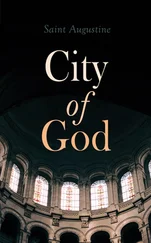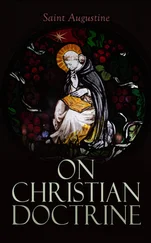1 ...7 8 9 11 12 13 ...31 22. Of the conjugal union as it was originally instituted and blessed by God.
But we, for our part, have no manner of doubt that to increase and multiply and replenish the earth in virtue of the blessing of God, is a gift of marriage as God instituted it from the beginning before man sinned, when He created them male and female,—in other words, two sexes manifestly distinct. And it was this work of God on which His blessing was pronounced. For no sooner had Scripture said, "Male and female created He them," [115]than it immediately continues, "And God blessed them, and God said unto them, Increase, and multiply, and replenish the earth, and subdue it," etc. And though all these things may not unsuitably be interpreted in a spiritual sense, yet "male and female" cannot be understood of two things in one man, as if there were in him one thing which rules, another which is ruled; but it is quite clear that they were created male and female, with bodies of different sexes, for the very purpose of begetting offspring, and so increasing, multiplying, and replenishing the earth; and it is great folly to oppose so plain a fact. It was not of the spirit which commands and the body which obeys, nor of the rational soul which rules and the irrational desire which is ruled, nor of the contemplative virtue which is supreme and the active which is subject, nor of the understanding of the mind and the sense of the body, but plainly of the matrimonial union by which the sexes are mutually bound together, that our Lord, when asked whether it were lawful for any cause to put away one's wife (for on account of the hardness of the hearts of the Israelites Moses permitted a bill of divorcement to be given), answered and said, "Have ye not read that He which made them at the beginning made them male and female, and said, For this cause shall a man leave father and mother, and shall cleave to his wife, and they twain shall be one flesh? Wherefore they are no more twain, but one flesh. What, therefore, God hath joined together, let not man put asunder." [116]It is certain, then, that from the first men were created, as we see and know them to be now, of two sexes, male and female, and that they are called one, either on account of the matrimonial union, or on account of the origin of the woman, who was created from the side of the man. And it is by this original example, which God Himself instituted, that the apostle admonishes all husbands to love their own wives in particular. [117]
23. Whether generation should have taken place even in Paradise had man not sinned, or whether there should have been any contention there between chastity and lust.
But he who says that there should have been neither copulation nor generation but for sin, virtually says that man's sin was necessary to complete the number of the saints. For if these two by not sinning should have continued to live alone, because, as is supposed, they could not have begotten children had they not sinned, then certainly sin was necessary in order that there might be not only two but many righteous men. And if this cannot be maintained without absurdity, we must rather believe that the number of the saints fit to complete this most blessed city would have been as great though no one had sinned, as it is now that the grace of God gathers its citizens out of the multitude of sinners, so long as the children of this world generate and are generated. [ 118]
And therefore that marriage, worthy of the happiness of Paradise, should have had desirable fruit without the shame of lust, had there been no sin. But how that could be, there is now no example to teach us. Nevertheless, it ought not to seem incredible that one member might serve the will without lust then, since so many serve it now. Do we now move our feet and hands when we will to do the things we would by means of these members? do we meet with no resistance in them, but perceive that they are ready servants of the will, both in our own case and in that of others, and especially of artisans employed in mechanical operations, by which the weakness and clumsiness of nature become, through industrious exercise, wonderfully dexterous? and shall we not believe that, like as all those members obediently serve the will, so also should the members have discharged the function of generation, though lust, the award of disobedience, had been awanting? Did not Cicero, in discussing the difference of governments in his De Republica , adopt a simile from human nature, and say that we command our bodily members as children, they are so obedient; but that the vicious parts of the soul must be treated as slaves, and be coerced with a more stringent authority? And no doubt, in the order of nature, the soul is more excellent than the body; and yet the soul commands the body more easily than itself. Nevertheless this lust, of which we at present speak, is the more shameful on this account, because the soul is therein neither master of itself, so as not to lust at all, nor of the body, so as to keep the members under the control of the will; for if they were thus ruled, there should be no shame. But now the soul is ashamed that the body, which by nature is inferior and subject to it, should resist its authority. For in the resistance experienced by the soul in the other emotions there is less shame, because the resistance is from itself, and thus, when it is conquered by itself, itself is the conqueror, although the conquest is inordinate and vicious, because accomplished by those parts of the soul which ought to be subject to reason, yet, being accomplished by its own parts and energies, the conquest is, as I say, its own. For when the soul conquers itself to a due subordination, so that its unreasonable motions are controlled by reason, while it again is subject to God, this is a conquest virtuous and praiseworthy. Yet there is less shame when the soul is resisted by its own vicious parts than when its will and order are resisted by the body, which is distinct from and inferior to it, and dependent on it for life itself.
But so long as the will retains under its authority the other members, without which the members excited by lust to resist the will cannot accomplish what they seek, chastity is preserved, and the delight of sin foregone. And certainly, had not culpable disobedience been visited with penal disobedience, the marriage of Paradise should have been ignorant of this struggle and rebellion, this quarrel between will and lust, that the will may be satisfied and lust restrained, but those members, like all the rest, should have obeyed the will. The field of generation [119]should have been sown by the organ created for this purpose, as the earth is sown by the hand. And whereas now, as we essay to investigate this subject more exactly, modesty hinders us, and compels us to ask pardon of chaste ears, there would have been no cause to do so, but we could have discoursed freely, and without fear of seeming obscene, upon all those points which occur to one who meditates on the subject. There would not have been even words which could be called obscene, but all that might be said of these members would have been as pure as what is said of the other parts of the body. Whoever, then, comes to the perusal of these pages with unchaste mind, let him blame his disposition, not his nature; let him brand the actings of his own impurity, not the words which necessity forces us to use, and for which every pure and pious reader or hearer will very readily pardon me, while I expose the folly of that scepticism which argues solely on the ground of its own experience, and has no faith in anything beyond. He who is not scandalized at the apostle's censure of the horrible wickedness of the women who "changed the natural use into that which is against nature," [120]will read all this without being shocked, especially as we are not, like Paul, citing and censuring a damnable uncleanness, but are explaining, so far as we can, human generation, while with Paul we avoid all obscenity of language.
Читать дальше












